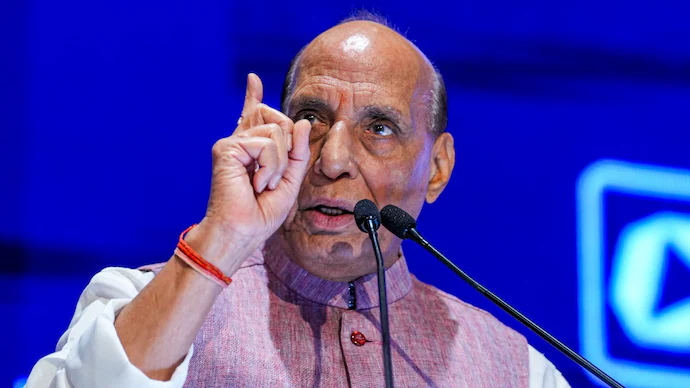Speaking at a conclave hosted in Dehradun, Defence Minister Rajnath Singh aptly highlighted the 'deep contradiction' in the global perception of India and its western neighbour.
“India and Pakistan gained independence at the same time. Today, India is recognised globally as the ‘Mother of Democracy,’ while Pakistan has earned notoriety as the ‘Father of Global Terrorism," he said.
 |
| Blogger and Rajnath Singh |
The Defence Minister also came down heavily on the United Nations for what he described as a shocking and ironic decision to appoint Pakistan as the Vice-Chair of the UN Counter-Terrorism Committee.
In a strongly worded statement, Singh said the move is akin to “making the cat guard the milk,” especially when the world knows Pakistan’s long-standing track record of sheltering and glorifying terrorists.
“It is unacceptable to even think that a terrorist can be someone’s freedom fighter. I had clearly stated this at the SAARC Interior Ministers’ meeting in Islamabad in 2016, where a section of Pakistan was attempting to legitimise terrorism in the name of freedom struggle,” he said.
From foreign policy point of view, things are at a vital crossroads.
India has come out of the 'shy' period and has shun the hesitancy. Today, it is assertive and is being heard. Coming 25 years would be very critical for India to attain its place globally. But healthy domestic polity and inclusive growth are must.
The high rates of economic growth have already ushered through domestic reforms. Maybe little more ought to be done in sectors like labour reforms. The agrarian reforms have hit roadblocks.
We should remember that improved reforms trajectory helped attract international investors. Economic attractiveness gives India a space to engage the rest of the world on its own terms.
A country needs to be 'flexible' and engage with the rest of the world to achieve win-win outcomes. So far, insiders say, the going has been good while powers such as the US and Russia cannot ignore India.
The Modi government has also ensured improved ties with the European world and the African nations.
It is true, in the year 2022, there was confirmation that New Delhi was taking a completely independent line. India is the only country among the Quad (three others being the US, Japan and Australia) which has not condemned Russia's invasion of Ukraine.
But the geo-political standing is such that none can easily condemn India.
The US today not long ago described India as an 'essential partner'.
In 2022, US State Department spokesman Ned Price has said: "....we have invested in that relationship (with India) in terms of our defence and security. So historical relationships notwithstanding, we are a partner of choice for India now, as are many of our partners and allies around the world".
The then US President Joe Biden (also in 2022) had only reemphasised the significance of Indo-US friendship.
"I am confident that in the years ahead our two democracies will continue to stand together to defend the rules-based order; foster greater peace, prosperity and security for our people; advance a free and open Indo-Pacific; and together address the challenges we face around the world," Biden had said on India's 75th anniversary of Independence Day.
There was a time India made lofty statements on democracy etc in countries such as Myanmar but that did not match its real strength.
An ambitious India is also realistic under Narendra Modi. It is now seeking to develop a new paradigm and playing a ‘leading state’ that seeks a place at the global high table.
Operation Sindoor is a redefining stage.
"As India’s economy continued to grow and the country engaged with the rest of the world on a more equal footing, India underwent a third evolution in the country’s strategic outlook. This shift, which is ongoing today, seeks to position India among the great powers by showcasing a willingness to take on more international responsibilities," ran an article in 'The Diplomat' a few years back.
Undoubtedly, Prime Minister Narendra Modi and his team have displayed skills as a smart and crafty diplomatic operative. India is taking on key 'global responsibilities' to achieve the holy grail in the international order:
a permanent seat at the United Nations Security Council.
Well, Modi has been well advised by suave foreign minister Dr S Jaishankar and NSA Ajit Doval, a former spy.
Former Foreign Secretary Harsh V Shringla too was a dutiful lieutenant.
History is rightly described as the most accommodating affair. Its pages are full of mortal men and women anointed with immortality. These spaces are not always given as accolades. The leaders have to earn it.
During the last decade and more Modi has pushed India's global influence both on strategic matters and also on the soft power front.
In 2015, Modi staged a huge publicity coup at the global stage. The International Day of Yoga started from that year and the move was recognized by the UN unanimously. In circa 2021, the essence of Diwali seemed to have changed.
It assumed almost a global respectability if not acceptability.
The peculiarity of a foreign policy is that it is generally guided by permanent features - the Geography and also the History.
The legacy is a matter of pride but some situations require tremendous amounts of course corrections.
In 2025... India has made its mission and journey clearer.
Under Prime Minister Modi, India's foreign policy & national security are revolutionised: dynamic diplomacy, zero tolerance for terror, record defence exports, and indigenous innovation.
This era marks unprecedented strategic autonomy. Eleven years of resolute leadership shaping a strong, secure, and self-reliant nation, positioning India as a formidable global power.







No comments:
Post a Comment